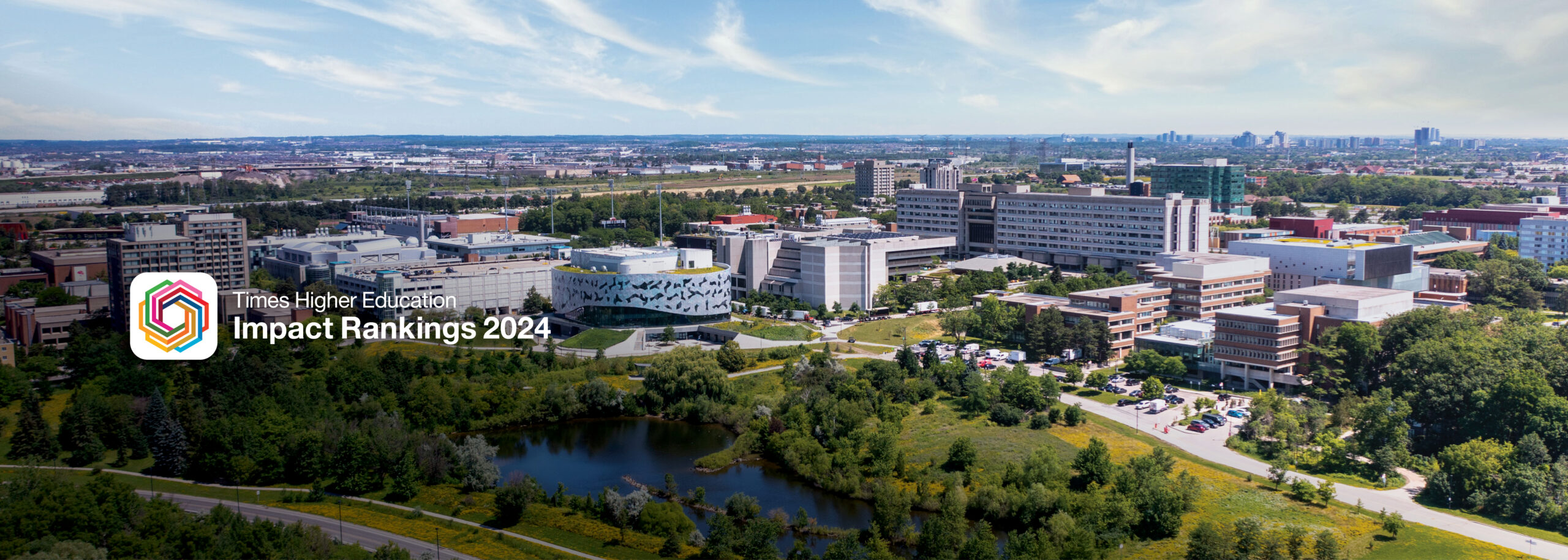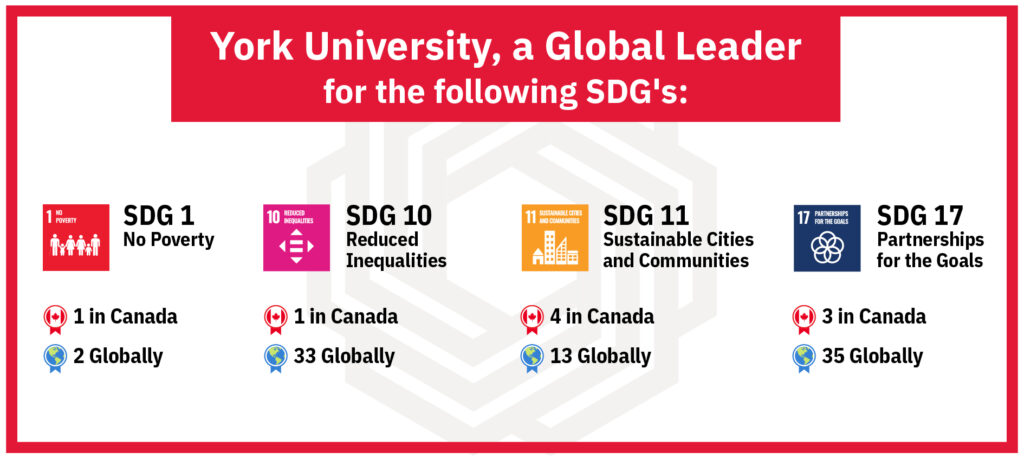
York University jumps five spots to 35th in world in today’s 2024 THE Impact Rankings
York also ranked number two in the world and number one in Canada for zero poverty, and number one in Canada for reduced inequalities
TORONTO, June 12, 2024 – York University champions sustainability and actively makes positive changes in local and global communities through its work on the United Nations’ Sustainable Development Goals (SDGs). Today’s 2024 Times Higher Education (THE) Impact Rankings announcement recognizes that work as York jumped five places to rank 35th in the world.
York’s overall ranking increased despite stiffer competition than last year with about 2,100 participating universities – approximately 300 more universities than previously. York also shot up 19 spots for zero poverty (SDG 1) to number two in the world and number one in Canada, and ranked number one in Canada for reduced inequalities (SDG 10).
THE Impact Rankings assesses universities around the world against the UN SDGs in research, stewardship, outreach and teaching.

“This is a University-wide achievement by our students, staff and faculty to demonstrably make a positive impact to the sustainable development goals through research, teaching, creativity and innovation,” says Rhonda Lenton, president and vice-chancellor of York University. “We have done particularly well in SDGs that align most strongly with our values as a University, including zero poverty, reduced inequalities, and sustainable cities and communities. I am proud that we continue to be recognized for our leadership in building a more sustainable and inclusive world.”
York also ranked 13th for sustainable cities and communities (SDG 11) and has moved up more than 30 spots to 35th in the world for SDG 17, local and global partnerships. The University’s dedication to advancing SDGs is embedded in its University Academic Plan 2020-2025. In addition, York placed in the top 50 worldwide for gender equality (SDG 5), responsible consumption and production (SDG 12), and peace justice and strong institutions (SDG 16).
The University supports reduced poverty through its Osgoode Hall Law School's Parkdale Community Legal Services program, established in 1971, and Community Legal Aid Services, both of which provide legal assistance to lower income Toronto area residents. In addition, York hosts the Canadian Observatory on Homelessness and the Homeless Hub.
By providing $1 million in support of Indigenous research and working with refugees at the Centre for Refugee Studies for more than 35 years, York is working to reduce inequality. Some 16,000 of York’s students are the first in their family to attend university. The institutional values of social justice, progressiveness, inclusivity, sustainability and excellence are infused into its Decolonizing, Equity, Diversity and Inclusion Strategy, Framework and Action Plan on Black Inclusion, and the Indigenous Framework, including the establishment of a dedicated Indigenous Research Ethics Board at York – the first for a post-secondary institution in Canada.
As academic lead of the UNITAR Global Water Academy and through its new Organized Research Unit, OneWATER, the University is helping to develop equitable and integrated solutions to local and global water challenges.
Through its Disaster and Emergency Management program and UNITAR’s CIFAL York, which serves as a hub for knowledge exchange and capacity building, the University is boosting sustainable cities and communities. York has held more than 200 music, drama and art public event days, and hosted free Nuit Blanche campus art installations in partnership with the City of Toronto.

York’s extensive network of partners and commitment to community-centred research have helped make possible a new Markham Campus – opening this fall in the heart of one of the most diverse and dynamic urban communities in the province – and a new, first-of-its kind School of Medicine to train primary care physicians. The University intends to offer a two-year bridging pathway for students who may not have considered a career in medicine or health to enhance access, equality and diversity within the health professions, as well as health equity for the people of Ontario.
Partnering with more than 50 organizations, including Queen’s University, industries, hospitals, governments and community partners, Connected Minds: Neural and Machine Systems for a Healthy, Just Society will help tackle the risks of breakthroughs in technology to vulnerable populations while promoting social health and justice for all, especially Indigenous Peoples in Canada. York received a record $318-million in funding for the Connected Minds program.
Being named one of Canada’s Greenest Employers in 2024 for the 12th consecutive year and one of Canada’s Best Diversity Employers 2024, further highlights York’s work in diversity and sustainability across our multiple campuses. York also continues to have a strong global position in the QS World University Rankings once again landing in the top 400 worldwide.
York supports the UN SDGs through these and many other initiatives as part of what it has always done best – contribute to positive change.
Learn more about how the York community is advancing the UN SDGs.
